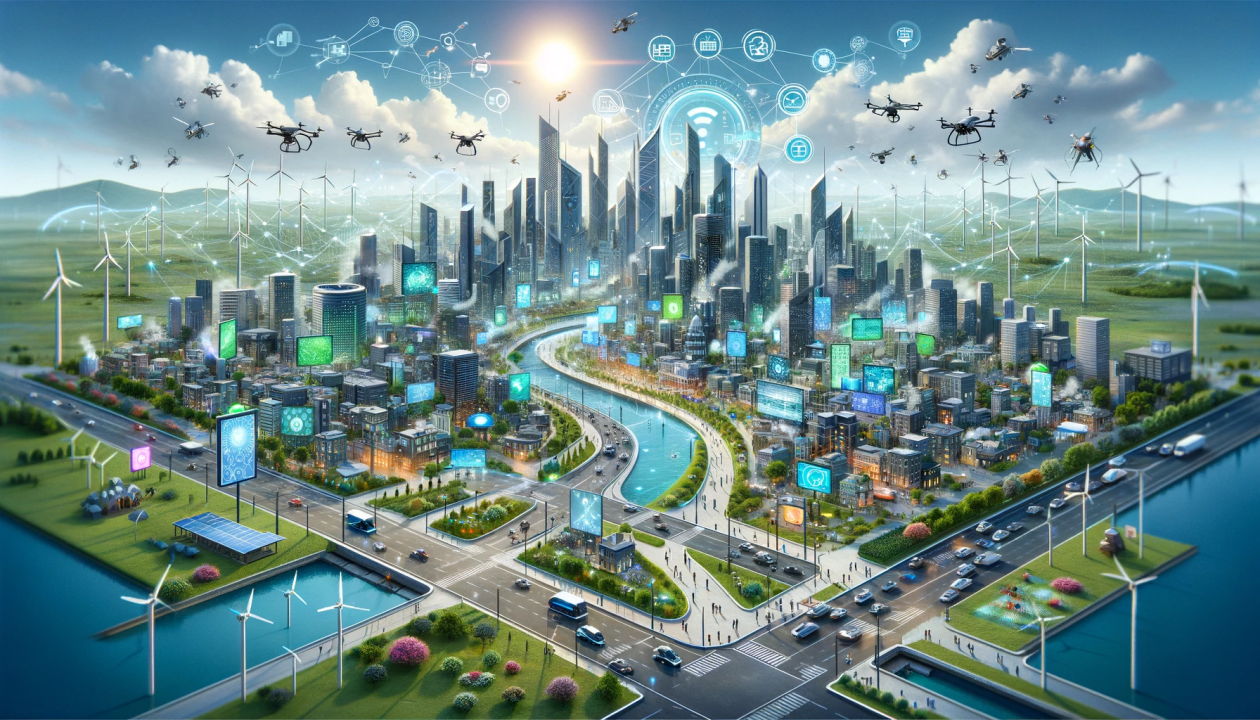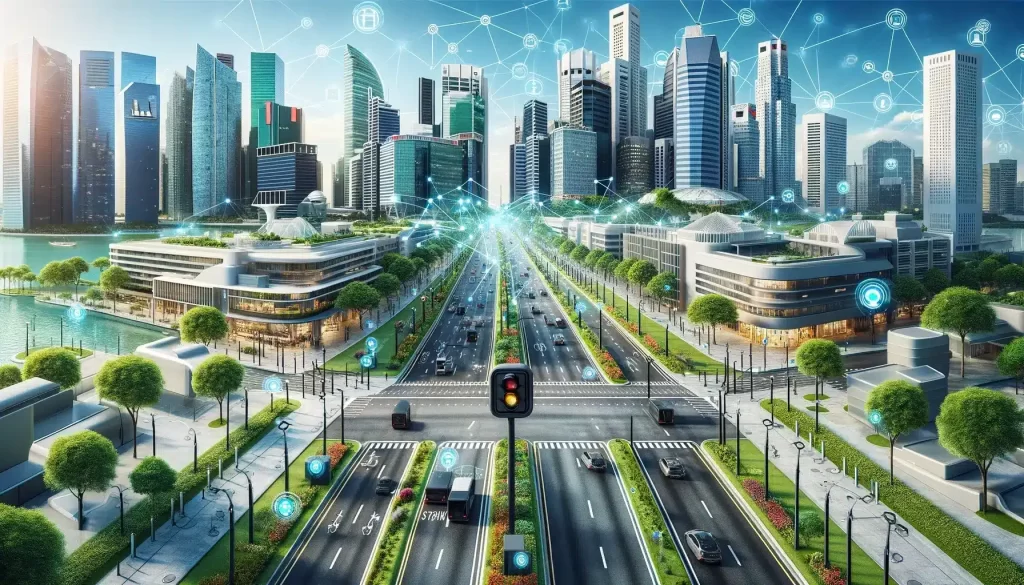Investing in Smart Cities: Merging Tech and Urban Development

Investing in smart cities is transforming urban landscapes. Technology and urban development, through smart building and technological advancements, are merging to create efficient, sustainable living spaces with green infrastructure and technological innovation. These innovations enhance quality of life in sustainable cities, boost economic growth through urban greening initiatives, and reduce environmental impact by utilizing sustainable energy sources and smart grid technology. From smart transportation to energy-efficient buildings, the future of cities lies in intelligent design, urban innovation, and economic development in this tech age. This blog explores how investing in smart cities in this tech age reshapes our communities and offers exciting opportunities for investors. Discover the benefits of being part of this revolutionary tech movement and understand why now is the perfect time to dive into this evolving sector.
Key Takeaways
- Smart cities use technology to improve urban living, making investments in them a chance to enhance community life and efficiency.
- Key elements include sustainable infrastructure, data analytics, tech, and smart transportation systems, which can all lead to better resource management.
- Investing in smart cities and tech can yield benefits like reduced energy costs, improved public safety, and enhanced quality of life for residents.
- Be aware of challenges such as funding limitations and the need for collaboration between government and tech companies when considering investments.
- For successful investment, prioritize tech projects that focus on community needs and long-term sustainability.
- Stay informed about emerging technologies and trends in urban development to make strategic investment decisions.
What is a Smart City
Definition
A smart city uses technology to improve urban life. It integrates different systems through data collection. Sensors and electronic methods gather information about traffic, weather, and energy use. This data helps cities make informed decisions.
Technology Integration
Smart cities rely on the Internet of Things (IoT). Residents can access services easily through apps. They can report issues like potholes or broken streetlights directly from their devices. Payments for taxes and utilities also occur via these platforms. This connectivity enhances the relationship between citizens and city officials.
Urban Connectivity
Data connects various aspects of urban living. For example, smart traffic lights adjust based on real-time traffic conditions. This reduces congestion and improves air quality. Waste management systems can monitor bin levels and optimize collection routes. These innovations promote sustainability and efficiency in daily operations.
Global Growth
The worldwide smart cities market continues to expand rapidly. By 2025, the market is expected to reach over $2 trillion. Cities around the world recognize the need for modernization. They aim to enhance citizen welfare while addressing challenges like climate change and urbanization.
Key Elements of Smart Cities
Connectivity
High-speed connectivity is crucial for smart cities. It ensures seamless communication between devices and systems. This connectivity supports the smart cities initiative by enabling real-time data exchange.
Data Collection
IoT and smart sensors play a key role in gathering data from the urban environment. These devices monitor various factors like air quality and traffic flow. The collected data helps improve city infrastructure and services.
Big Data Analysis
Big Data processes vast amounts of information quickly. It allows city planners to analyze trends and make informed decisions. By using analytics, cities can enhance urban efficiency and address challenges effectively.
Artificial Intelligence
AI technology recognizes patterns in urban data. It predicts trends and automates tasks within the city. For example, intelligent traffic lights adjust based on real-time traffic conditions to improve mobility.
Cyber-Physical Systems
Integrating cyber-physical systems enables cities to execute operations based on data-driven insights. These systems connect physical infrastructure with digital technologies. They enhance responsiveness to urban challenges, making cities more sustainable.
Smart housing and smart buildings are also essential components. They utilize these technologies to create a better living environment. Overall, these elements work together to form a more efficient and sustainable urban landscape.
Benefits and Applications of Smart Cities
Urban Mobility
Mobility as a Service (MaaS) improves urban mobility. It allows users to plan and pay for various transport options in one app. This makes travel easier and more personalized. People can choose from buses, bikes, or rideshares based on their needs.
Energy Efficiency
Smart grid technologies enhance energy efficiency. These systems monitor energy use in real-time. They help reduce waste and lower costs for residents. Cities can also integrate renewable energy sources, promoting sustainability.
Public Safety
Real-time monitoring boosts public safety. Cameras and sensors track activity in key areas. Predictive analytics can identify potential threats before they happen. This proactive approach helps keep communities safer.
Waste Management
Smart bins streamline waste management. These bins notify collection services when full. This ensures timely pickups and reduces unnecessary trips. The result is cleaner streets and efficient operations.
Economic Growth
Attracting tech companies fosters economic growth. Smart cities create environments that support innovation. Startups thrive in these areas, leading to job creation and improved public services.

Challenges in Smart City Investments
High Costs
Smart city spending often faces high initial costs. Infrastructure and technology deployment can require significant financial resources. Cities must budget for advanced infrastructure, which may strain their finances.
Data Privacy
Data privacy remains a critical concern. As cities adopt new technologies, they gather vast amounts of data. Protecting this information from cyber threats is essential. Citizens must trust that their personal data will be secure.
Regulatory Barriers
Regulatory and policy barriers can hinder innovation. Local governments may have outdated laws that slow down technology integration. Overcoming these obstacles requires collaboration between government and private sectors.
Interoperability Issues
Interoperability between different systems poses challenges. Many smart city solutions come from various vendors. Ensuring these systems work together smoothly is crucial for success. Cities need to invest in compatible technologies.
Community Engagement
Engaging citizens and stakeholders is vital for effective urban development. Successful smart city initiatives depend on community input. Citizens should have a voice in planning processes to ensure their needs are met.
Closing Thoughts
Investing in smart cities is a game-changer for urban development. You’ve seen how technology can enhance city life, boost efficiency, and tackle challenges. The benefits are clear, but so are the hurdles. Understanding these factors is key to making smart investments.
Your next step? Dive deeper into smart city initiatives in your area. Engage with local leaders and explore partnerships that align with your goals. Embrace the future of urban living. The potential is massive, and your involvement matters. Don’t miss out on shaping tomorrow’s cities today.
Frequently Asked Questions
What defines a smart city?
A smart city leverages technology and data to enhance urban living. It integrates IoT, AI, and sustainable practices to improve infrastructure, services, and quality of life for residents.
How do smart cities benefit residents?
Smart cities offer improved public services, reduced traffic congestion, enhanced safety, and better environmental management. These benefits lead to a higher quality of life and increased economic opportunities.
What technologies are essential for smart cities?
Key technologies include Internet of Things (IoT), big data analytics, artificial intelligence (AI), and renewable energy systems. These tools help optimize urban operations and improve resource management.
What are the main challenges in investing in smart cities?
Challenges include high initial costs, regulatory hurdles, data privacy concerns, and the need for public-private partnerships. Addressing these issues is crucial for successful implementation.
How can businesses benefit from investing in smart cities?
Businesses can tap into new markets, foster innovation, and enhance operational efficiency. Investing in smart city projects can lead to long-term financial returns and brand recognition.
Are smart cities environmentally friendly?
Yes, smart cities prioritize sustainability by using renewable energy sources, reducing waste, and improving air quality. This focus helps combat climate change and promotes healthier urban environments.
What role do citizens play in smart cities?
Citizens contribute through engagement and feedback on urban initiatives. Their participation ensures that smart city developments meet community needs and enhance overall livability.
 Send Buck a voice message!
Send Buck a voice message!



